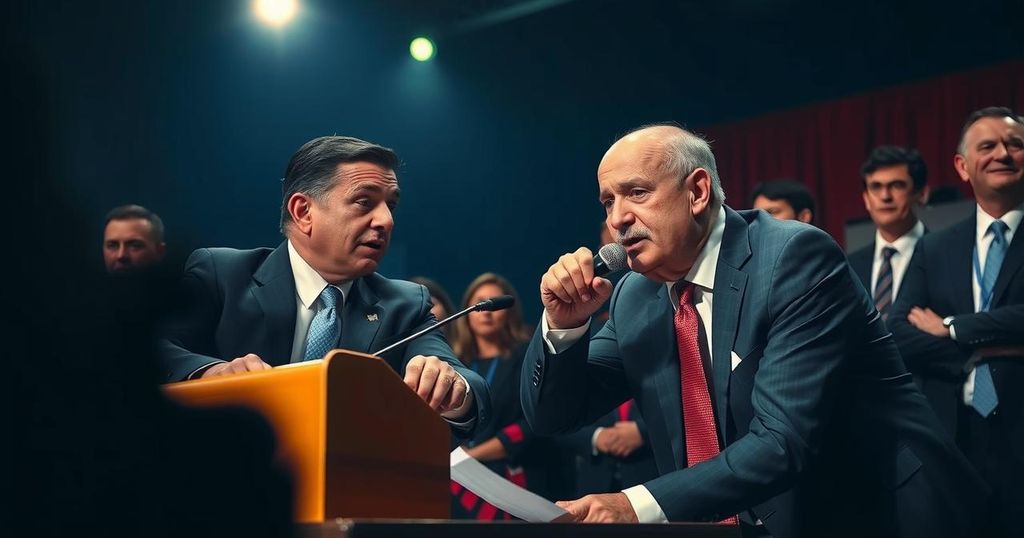Uruguay’s presidential runoff election has become a close contest between Álvaro Delgado of the National Party and Yamandú Orsi of the Broad Front, following an initial round where Orsi led with 44% of the votes. The election reflects significant voter indecision and concerns around crime, with both candidates promoting contrasting visions for the country’s future governance. Analysts suggest that this election exemplifies the strength of Uruguay’s democratic processes amidst a backdrop of rising voter engagement and social consciousness.
Uruguay is witnessing a closely contested presidential runoff election that has transformed from what was expected to be a dull political affair. On November 26, 2024, voters will choose between Álvaro Delgado, representing the ruling National Party, and Yamandú Orsi from the leftist coalition known as the Broad Front. The election outcome is crucial, especially after the failure of candidates to secure an outright majority in the initial round held on October 27, which resulted in Delgado garnering 27% of the votes against Orsi’s 44%.
In the first round, Orsi’s coalition outperformed, but the combined efforts of other conservative parties, especially the Colorado Party, provided Delgado with a competitive edge. Amidst an evenly split Congress, voter indecision remains high due to lackluster campaigning and broad consensus on key issues such as taxation and social spending. Many Uruguayan voters expressed their frustrations, which have led to relatively low engagement in a campaign which has not centered around polarizing topics often seen in other democracies.
As both candidates focus on mitigating rising crime rates in what was once considered a stable nation, Delgado, a seasoned member of the National Party, is promising continuity with the policies of the incumbent President Lacalle Pou. Meanwhile, Orsi seeks to redefine the left’s approach in Uruguay with progressive plans for economic enhancement and social welfare. This election cycle outlines both candidates’ differing views on moving forward, as Orsi attempts to bring a renewed focus on workers’ rights and tax reforms, whereas Delgado proposes sustained market-friendly policies.
Analysts suggest that the current election reflects Uruguay’s robust democracy, wherein essential political discussions progress without the deep-seated divisions noted in other regions. The clashing styles of both candidates along with their contrasting visions will significantly shape the nation’s future, as voters prepare to make their pivotal decision shortly before the runoff takes place.
The political landscape in Uruguay depicts a notable shift as the country gears up for the second round of its presidential election. Historically characterized by a sense of stability, the 2024 elections saw significant engagement among voters, culminating from deep-rooted anxieties regarding governance outcomes and escalating crime rates. The two primary candidates, Álvaro Delgado from the National Party and Yamandú Orsi from the Broad Front, both represent divergent ideologies and have compelling familial backgrounds influencing their political narratives. Delgado’s approach hinges on preserving the current administration’s direction while Orsi intends to usher in a new ideology to the left, that retains workers’ rights. This election has demonstrated a crucial point regarding the citizens’ focus on issues like social policy and economic integrity, marking a noteworthy moment in Uruguay’s democratic process. This changing dynamic illustrates a growing voter consciousness that extends beyond party allegiances, thus prompting the engagement of younger demographics and a tighter race than anticipated. Amidst these developments, understanding the electorate’s motivations provides vital context to comprehend the ongoing electoral trends and their implications for Uruguay’s governance.
In conclusion, the Runoff Presidential Election in Uruguay exemplifies a critical juncture in the nation’s political progression. As citizens prepare to cast their votes, the outcomes hinge upon the parties’ differing approaches to vital societal issues, including crime, social services, and economic stability. The election represents not only a contest for leadership but also serves as a reflection of Uruguay’s evolving political landscape and the active engagement of its populace in shaping the future direction of their governance.
Original Source: apnews.com






